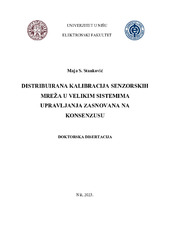| dc.contributor.advisor | Antić, Dragan | |
| dc.contributor.other | Mitić, Darko | |
| dc.contributor.other | Nikolić, Vlastimir | |
| dc.contributor.other | Milojković, Marko | |
| dc.contributor.other | Nikolić, Saša S. | |
| dc.creator | Stanković, Maja S. | |
| dc.date.accessioned | 2024-02-07T15:04:22Z | |
| dc.date.available | 2024-02-07T15:04:22Z | |
| dc.date.issued | 2023 | |
| dc.identifier.uri | http://eteze.ni.ac.rs/application/showtheses?thesesId=8642 | |
| dc.identifier.uri | https://fedorani.ni.ac.rs/fedora/get/o:2097/bdef:Content/download | |
| dc.identifier.uri | https://plus.cobiss.net/cobiss/sr/sr/bib/131590921 | |
| dc.identifier.uri | https://nardus.mpn.gov.rs/handle/123456789/22213 | |
| dc.description.abstract | This Ph. dissertation is devoted to the problem of distributed macro-calibration of large sensor networks which is of great importance for large scale systems control, Cyber-physical Systems and Internet of Things. The main contribution of the thesis is the proposal of a novel algorithm for distributed blind macro-calibration which offers a practically efficient solution by ensuring asymptotic consensus of the corrected sensor gains and offsets. The algorithm is based on independent recursive gain corrections using the instrumental variable algorithm derived from the mean-square value of the corrected signal increment measurements, working in parallel with recursive offset corrections using a gradient algorithm derived from the mean-square value of the corrected signal measurements themselves. It is proved that the corrected gains and offsets converge in the mean-square sense and with probability one to consensus for large classes of signals and communication networks. It is also proved that the proposed algorithm converges in the mean-square sense and with probability one in the presence of communication and mesurement noises for both synchronous and asynchronous communications. Convergence in the mean-square sense and with probability one is proved for an original nonlinear calibration algorithm which is robust with respect to the noise contaminated by sporadic large realizations. It is also proved that a suitable choice of a reference sensor enables getting convergence of all the corrected gains and offsets to a priori chosen reference values. The theoretical results are practically verified by numerous characteristic simulations which confirm all the derived conclusions. | en |
| dc.format | application/pdf | |
| dc.language | sr | |
| dc.publisher | Универзитет у Нишу, Електронски факултет | sr |
| dc.rights | openAccess | en |
| dc.rights.uri | https://creativecommons.org/licenses/by-nc-nd/4.0/ | |
| dc.source | Универзитет у Нишу | sr |
| dc.subject | Mrežni sistemi upravljanja, kalibracija senzorskih mreža,
distribuirana stohastička aproksimacija, dinamički
konsenzus, brzina konvergencije, statistička robusnost | sr |
| dc.subject | Networked control systems, calibration of sensor
networks, distributed stochastic approximation,
dynamic consensus, convergence rate, statistical
robustness | en |
| dc.title | Distribuirana kalibracija senzorskih mreža u velikim sistemima upravljanja zasnovana na konsenzusu | sr |
| dc.type | doctoralThesis | |
| dc.rights.license | BY-NC-ND | |
| dc.identifier.fulltext | http://nardus.mpn.gov.rs/bitstream/id/159431/Doctoral_thesis_14910.pdf | |
| dc.identifier.fulltext | http://nardus.mpn.gov.rs/bitstream/id/159432/Stankovic_Maja_S.pdf | |
| dc.identifier.rcub | https://hdl.handle.net/21.15107/rcub_nardus_22213 | |



